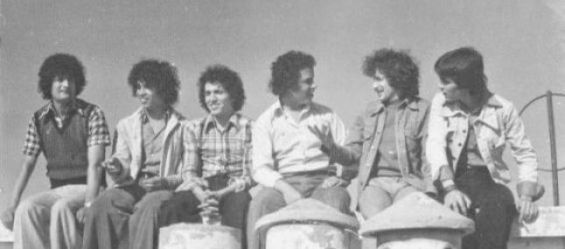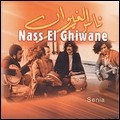The Amazigh group Ousmane emerged in the early 1970s, playing a major role in Amazigh music's development and dissemination among Moroccan and international music lovers. Despite its brief four-year run, the group paved the way for many subsequent Amazigh groups.
This period, the late 1960s and early 1970s, also saw the rise of Nass El Ghiwane, a group that left an indelible mark on Moroccan music history with their timeless songs. Nass El Ghiwane drew on traditional instruments like the guembri, bendir, and banjo. Inspired by this vibrant scene, the Amazigh group Ousmane emerged under the auspices of the Moroccan Association for Research and Cultural Exchange, founded in 1967 to promote Amazigh culture.
Instant success with the first song
The concept of creating the first modern Amazigh lyrical group originated with the late poet Ibrahim Akhyat, a founder of the association. Akhyat sought talent within the association to form his group, ultimately selecting six members: the late Amouri M'barek (vocals, composition, guitar), Belaid Elakkaf (guitar), Saïd Bijaâd (violin), the late Saïd Boutroufine (percussion), Yazid Qarafi (accordion), and Tariq Maaroufi (organ).

«Taguendaout», the group's debut song, became a phenomenal success, resonating with all Amazigh speakers. Unlike Nass El Ghiwane, Ousmane embraced modern instruments from the outset, incorporating guitar, violin, and accordion alongside traditional ones. The group's repertoire, focused on thematic songs, drew from poets associated with the Moroccan Association for Research and Cultural Exchange.
Commenting on this artistic process, Belaid Elakkaf has previously said that he used to play his music «with Western instruments, such as the electric guitar and the keyboard». «We used to perform texts written by great poets such as the late Ali Sedki Azaigo, Omar Amrier, Mohamed Mastaoui, the late Ibrahim Khayat and the late Mohamed El Jechtimi», he recalls.
A historic moment on stage at Olympia
In 1976, the group, often called the Amazigh-speaking pioneers, achieved international recognition with a European tour. They performed in France and Belgium alongside Nass El Ghiwane and the brothers Mahmoud and Younès Megri.
Belaid Elakkaf vividly recalls those moments, especially the concert at the Olympia in Paris, a prestigious venue where legendary artists like Charles Aznavour, Oum Kalthoum, Abdel Halim Hafez, and Mohammed Abdel Wahab had performed. «I remember walking back and forth on the theatre stage, repeating to myself in amazement that Charles Aznavour had performed here, as well as Oum Kalthoum, Abdel Halim Hafez, Mohammed Abdel Wahab... All the great international artists performed here», he says.
«We were the first group singing in Amazigh to perform at L'Olympia. Our evening with the groups Nass El Ghiwane and les Frères Megri was a success on every level, with great interaction from the audience, who flocked to the venue and filled all their seats».
Following this international success, the group was spotted by Moroccan Radio and Television (RTM). The group were invited to appear on a number of shows, making them the first Amazigh group to have sung in the country's audiovisual media. Although the group was only active for four years, from 1974 to 1978, it left a rich and varied repertoire of exceptional songs and poems.
Links with king Hassan II
Belaid Elakkaf shares an unforgettable anecdote linked to Ousmane's late producer, Hamid Alaoui, who produced their first two singles. Belaid explains that Alaoui «was about to leave his office on rue Allal Benabdellah in Rabat when two men who identified themselves as police approached him unexpectedly». They asked for his name and confirmed if he was the group's producer, which understandably frightened him.
However, the men reassured him and made a surprising request. They explained that «King Hassan II wanted to listen to the group Ousmane, but they couldn't find the cassettes on the market». The agents asked the producer if he still had any copies. «Relieved, his fear dissipated», Belaid explains.
Alaoui took them back to his office, opened a box full of cassettes, and gave them some. According to Belaid, the group later heard «from civil servants» that «King Hassan II was listening to the cassettes and enjoying the group's songs».

Despite disbanding, Ousmane's members remain admired. They continue to receive tributes in recognition of their lasting contribution to promoting Amazigh music and culture. Notably, in early 2020, the network of Cultural Cafés in Morocco honored the group.




 chargement...
chargement...












